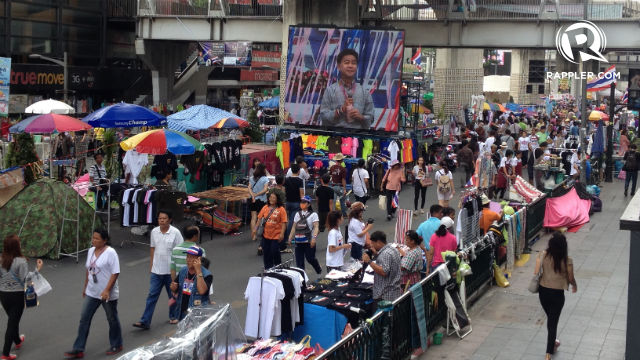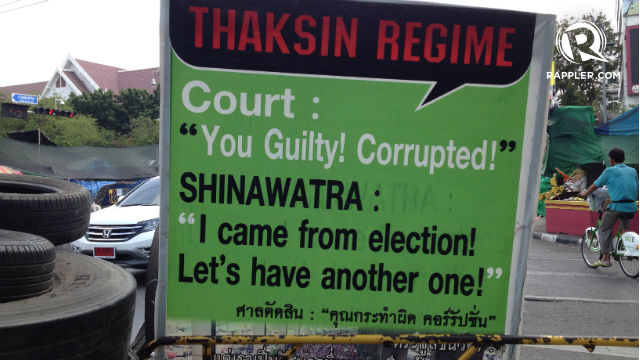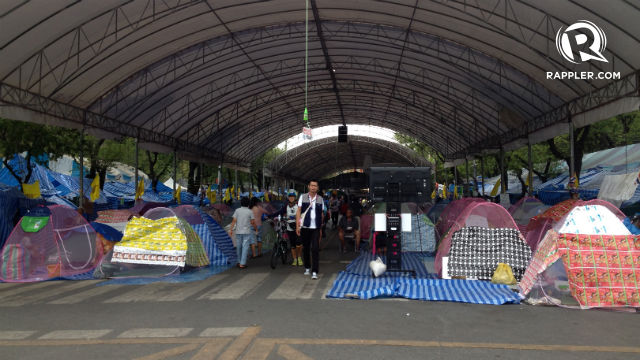SUMMARY
This is AI generated summarization, which may have errors. For context, always refer to the full article.

BANGKOK, Thailand – Inside Siam Center, one of Bangkok’s ritziest shopping malls, the air-conditioning is strong and the latest fashion is on display, but there are few buyers.
Most of the shoppers are out on the street, buying food and souvenir items from vendors while anti-government protestors wearing colorful headbands and whistles dally about. Overhead, large digital screens broadcast speeches by protest leaders in another rally site across the city. Thai teenagers take selfies while party music blasts over loud speakers. The scene is more akin to a noisy street fair than a political protest. Only the tire barricades that block each end of the intersection indicate anything extraordinary about the whole area.
Soft measures
Two months after anti-government protestors began occupying key intersections and government offices, as part of a plan to ‘Shutdown Bangkok,’ the besieged government of Prime Minister Yingluck Shinawatra announced plans to clear the rally sites on Friday, February 14, a national Buddhist holiday.
Police managed to peacefully reopen at least one intersection but left the largest rally sites in the Siam shopping district remain untouched. Authorities say they will take ‘soft measures’ to clear protest sites.
The protestors, led by opposition leader Suthep Thaugsuban, want the Prime Minister to step down, amidst allegations of corruption and interference by her brother, ousted prime minister Thaksin Shinawatra. The opposition boycotted recent elections held on February 2 and vowed to ‘fight to the end.’ They also called for an appointed “People’s Council” to manage government affairs. Yingluck has refused to step down but is acting in a caretaker capacity as the votes are counted.

Populist policies
On Monday, February 17, angry farmers surrounded the prime minister’s main office, Government House, to demand payment for rice subsidies promised to them in October by the Shinawatra administration. The government is now in a rush to secure more than $4.4 billion to fund the failed rice subsidy scheme and has resorted to selling its rice stocks below the world market price.
It is populist policies such as this that have endeared Yingluck Shinawatra and her brother to Thailand’s rural and urban poor. One Bangkok taxi driver told Rappler he liked the Shinawatras because they were pro-poor, unlike the richer Bangkok middle class.
But in the southern parts of Thailand, as well as to those from more affluent areas, support for the siblings were never strong.
“Thaksin [gives] us the cash but not the tools (to be rich),” said Putti Naktongkul, a retired engineer. He added that vote buying in Thailand during elections is commonplace. Naktongkul moved to the tourist town of Krabi to start a new tourism-related business after working in Bangkok for 20 years. He fears the economy will worsen if the government and opposition won’t resolve their differences soon.

Impact on tourism
The Tourism Council of Thailand projects the country could lose up to 22.5 billion baht ($684 million) in the first quarter of 2014. Tourist-rich countries like China and the US have issued travel warnings, which could further dampen arrivals.
Backpackers and other tourists are still a common site on Bangkok’s streets with the protest sites fast becoming tourist and shopping attractions. This is, according to one Bangkok resident, a very uniquely Thai way of bringing down the government.
“Protests here are very peaceful. We go to the rally site to buy different things from the protestors,” said Pranee, who works as a secretary for a multinational organization.
Just outside her office along Ratchadamnoen Nok Road, protestors have occupied both lanes, complete with tents, toilet facilities, and a communal kitchen. Supporters regularly donate food and water, which is offered free even to passers-by.
Policemen, stationed a few meters away from the barricades, guide traffic and watch the protestors walk in and out. With memories of December’s violent scuffles fresh on their minds, neither group seems in a rush to break the status quo. – Rappler.com
Add a comment
How does this make you feel?
There are no comments yet. Add your comment to start the conversation.